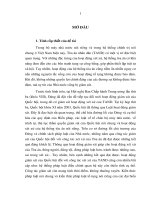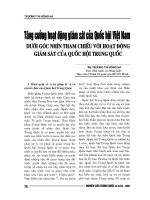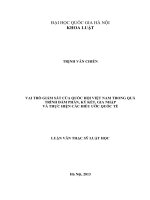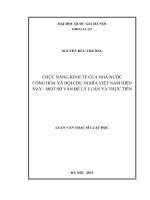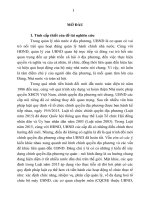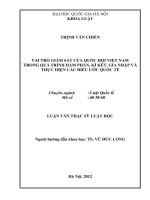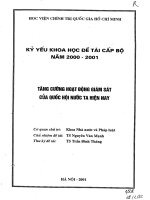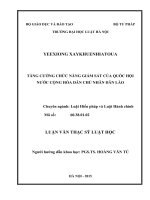Chức năng giám sát của ủy ban tư pháp của quốc hội việt nam hiện nay tt tieng anh
Bạn đang xem bản rút gọn của tài liệu. Xem và tải ngay bản đầy đủ của tài liệu tại đây (622.12 KB, 35 trang )
MINISTRY OF EDUCATION AND TRAINING
MINISTRY OF JUSTICE
HANOI LAW UNIVERSITY
CAO MANH LINH
THE CURRENT OVERSIGHT FUNCTION OF
THE COMMITTEE ON JUDICIAL AFFAIRS OF
THE NATIONAL ASSEMBLY OF VIETNAM
Major: Theory and History of State and law
Code: 9.38.01.06
SUMMARY OF DOCTORAL THESIS IN LAW
Hanoi - 2020
The thesis is completed at Hanoi Law University
Supervisor: Assoc. Prof. Dr. Nguyen Thi Hoi
Referee 1:
Referee 2:
Referee 3:
The thesis will be examined by the University’s Examination Board for
doctoral theses at Hanoi Law University at.................., on ............. 2020
The thesis can be found at: - National Library of Vietnam
- Library of Hanoi Law University
1
INTRODUCTION
1. The necessity of the research
The Committee on Judicial Affairs is a newly established agency
of the National Assembly. Besides the functions to examine and make
recommendations, oversight is an important function of the Committee
on Judicial Affairs. Recently, despite heavy workload, the complicated
nature of the work and its modest organizational structure, the oversight
activities of the Committee on Judicial Affairs have achieved many
positive results. However, compared to requirements, the oversight
function of the Committee on Judicial Affairs has the following
limitations: the scope of monitored fields is broader than the practical
capacity of the Committee; supervisory contents mainly focuses on
monitoring the implementation of laws among relevant agencies
without paying attention to overseeing the promulgation of legal
documents; some supervisory contents have not been highly effective
yet; supervisory methods have not been combined synchronously and
reasonably; major obstacles and shortcomings in the performance of
relevant
agencies
are
hardly
detected.
Many
requests
and
recommendations after supervision are still general, lack of specific
targets, requirements and addresses; the monitoring and supervision of
the implementation of requests and recommendations have not been
conducted regularly and profoundly. The reason is partly due to
theoretical awareness and partly due to limitations in laws,
organizational structure and inappropriate implementation of the
supervision. Therefore, to contribute to clarifying theoretical and
practical issues, based on which to propose solutions to improve the
oversight function of the Committee on Judicial Affairs, to meet the
2
requirements of improving the efficiency and effectiveness of
supervision, to ensure and protect human and civil rights, to promote
judicial and administrative reforms, to build and complete the socialist
rule-of-law state of Vietnam, the PhD Candidate chose to study “The
current oversight function of the Committee on Judicial Affairs of the
National Assembly of Vietnam” in his dotoral thesis.
2. Research purpose and tasks of the thesis
The research purpose of the thesis is to clarify theoretical and
practical issues on the oversight function of the Committee on Judicial
Affairs of the National Assembly of Vietnam, based on which to
propose solutions to complete the oversight function of the Committee
on Judicial Affairs.
Research tasks of the thesis is to study the theory of the oversight
function of the Committee on Judicial Affairs of the National Assembly
of Vietnam (including the concept, characteristics, contents and
methods to perform the oversight function; the relationship and the
differences between the supervision of the Committee on Judicial
Affairs and some other control mechanisms for state power; factors
affecting the oversight function of the Committee on Judicial Affairs);
to assess the current status of the oversight function of the Committee
on Judicial Affairs of the National Assembly of Vietnam, to point out
results, shortcomings, limitations and causes; and on that basis, to
propose suitable viewpoints and solutions to complete the oversight
function of the Committee on Judicial Affairs.
3. Research subjects and scope of the thesis
The research subjects of the thesis are theoretical and practical
issues on the oversight function of the Committee on Judicial Affairs of
the National Assembly of Vietnam in the context of innovating the
3
National Assembly’s organization and operation, strengthening the
control of state power, protecting human and civil rights, speeding up
judicial and administrative reform as well as building Vietnam as a
socialist rule-of-law state.
The research scope of the thesis is to study the oversight function
of the Committee on Judicial Affairs of the National Assembly of
Vietnam since the Committee was established and came into operation;
to study the oversight functions of the Committee on Judicial Affairs (or
corresponding Committee) of the National Assembly/Parliament of
some countries in order to draw the experience that can be applied to
the Committee on Judicial Affairs of the National Assembly of
Vietnam.
4. Research methods
The thesis is conducted based on the views of Marxism-Leninism,
Ho Chi Minh's thoughts about the State and Law, some progressive
political-legal ideas as well as views and policies of the Party on
building the rule-of-law state. The thesis uses specific research methods
such as analysis, comparison, synthesis, statistics and history.
5. The meaning and new contributions of the thesis
The thesis has contributed to clarify theoretical issues about the
oversight function of the Committee on Judicial Affairs of the National
Assembly of Vietnam. It also assesses the current status of the oversight
function of the Committee on Judicial Affairs, point out the causes and
propose some viewpoints and solutions. The thesis's research results can
be consulted to complete the Party's guidelines and policies, to improve
legal regulations on the organization and oversight function of the
National Assembly and the Committee on Judicial Affairs, and to
complete mechanisms to supervise judicial agencies, judicial activities
4
as well as the prevention and fighting against corruption.
Regarding new contributions, the thesis has further studied,
systematized and analyzed the theoretical viewpoint of limitations in the
oversight function of the National Assembly, especially when
supervising the People's Court, the agency that executes judicial rights,
in the context of promoting the role of the National Assembly in
ensuring and protecting human and civil rights. The thesis also clarifies
some theoretical issues about the oversight function of the Ethnic
Council and Committees of the National Assembly, the relationship
with the oversight function of the National Assembly and some basic
characteristics. At the same time, the thesis has studied, assessed
comprehensively and systematically the history of formation, the need
to establish the Committee on Judicial Affairs. This is the first time
there has been a comprehensive study of the concepts, characteristics,
roles, contents and methods to execute the oversight function of the
Committee on Judicial Affairs of the National Assembly of Vietnam.
The thesis also analyzes the relationship and differences between the
oversight function of the Committee on Judicial Affairs and some other
control mechanisms of state power. It clarifies some affecting factors
and the influence of each factor on the oversight function of the
Committee on Judicial Affairs. On that basis, the thesis has assessed the
status of the oversight function of the Committee on Judicial Affairs of
the National Assembly of Vietnam on the following aspects: the reality
of legal provisions, the reality of executing the oversight function and
the reality of impact factors. The thesis analyzed and interpreted the
obtained results, limitations and causes of those limitations. The thesis
proposed some viewpoints and solutions to complete the oversight
5
function of the Committee on Judicial Affairs of the National Assembly
of Vietnam.
6. Structure of the thesis
Besides the “Introduction”, “Conclusion”, “List of Reference”,
“Annex”, the thesis is divided into 4 chapters as follows:
Chapter 1: Literature review on the thesis’s issues
Chapter 2: Theories on the oversight function of the Committee on
Judicial Affairs of the National Assembly
Chapter 3: The actual state of the oversight function of the
Committee on Judicial Affairs of the National Assembly.
Chapter 4: Viewpoints and solutions to complete the oversight
function of the Committee on Judicial Affairs of the National Assembly
of Vietnam.
6
Chapter 1
LITERATURE REVIEW ON THE THESIS’S ISSUES
The thesis refers to a new research topic. Through survey, the PhD
Candidate has not found any domestic or foreign research that provides
comprehensive and systematic study about this issue. However, some
domestic studies and articles on the supervision of the National
Assembly and the National Assembly’s agencies as well as on the
organization and operation of the Committee on Judicial Affairs relate
to some research aspects of the thesis. Although these studies are brief,
they are valuable for reference. After researching, the thesis has
systematized and evaluated the contents of studies according to specific
groups as follows: (i) Studies of theories of the oversight function of the
Committee on Judicial Affairs of the National Assembly of Vietnam;
(ii) Studies of the actual status of the oversight function of the
Committee on Judicial Affairs of the National Assembly of Vietnam;
(iii) Studies of the viewpoints and solutions to complete the oversight
function of the Committee on Judicial Affairs of the National Assembly
of Vietnam.
The systematization and evaluation of the contents of existing
research show that studies into the oversight function of the National
Assembly and agencies of the National Assembly are very diversified
and have basically clarified relevant theoretical aspects. However,
although theories of the National Assembly's supervision of judicial
rights and the limit of supervision for the execution of judicial rights
among the Ethnic Council and Committees of the National Assembly
have been studied, they are not in systematic order and some contents
have not been clarified. Direct research into the theory of the oversight
7
function of the Committee on Judicial Affairs are few, unprofound and
incomprehensive. The assessment of the actual status of the oversight
function of the Committee on Judicial Affairs mainly focuses on
supervision of specific cases, the relationship between supervision and
the requirements to ensure the independence of judicial rights as well as
the reality of supervision according to each specific oversight method.
There have been some studies referring to viewpoints and solutions,
however, such solutions to complete the legal system were all proposed
before the National Assembly promulgated the Law on the organization
of the National Assembly in 2014, the Law on the oversight activities of
the National Assembly and the People's Council in 2015 and other laws
on the organization of the state apparatus, therefore, they are no longer
updated.
Other
recommendations
on
organizational
structure,
innovation of monitoring methods and assurance conditions are too
brief and general.
Through evaluating literature review, the thesis identifies issues
that need further study and settlement as follows: (i) Theory of the
limits in supervision by the National Assembly and the Committee on
Judicial Affairs, especially when supervising the Court, the agency that
exercises judicial rights, placed in relation to the request to ensure the
representative role of the National Assembly and the National
Assembly's role in ensuring and protecting human and civil rights;
characteristics of the oversight function of the Ethnic Council and
Committees of the National Assembly; the need to establish, the
position and the role of the Committee on Judicial Affairs; the concept
and peculiarity of the oversight function of the Committee on Judicial
Affairs; contents, implementation methods and factors affecting the
oversight function of the Committee on Judicial Affairs; (ii) The actual
8
status of the oversight function of the Committee on Judicial Affairs in
terms of laws, implementation and impact factors; (iii) Viewpoints and
specific solutions to be taken to continue completing the oversight
function of the Committee on Judicial Affairs. At the same time, based
on the issues that need further research, the thesis presented some
scientific hypotheses and research questions to guide the research and
solve the problems posed to the thesis.
9
Chapter 2
THEORIES ON THE OVERSIGHT FUNCTION
OF THE COMMITTEE ON JUDICIAL AFFAIRS OF
THE NATIONAL ASSEMBLY
2.1. Overview of the oversight function of the National
Assembly and the oversight function of the Committees of the
National Assembly
2.1.1. The oversight function of the National Assembly
In order to meet the requirements for building a rule-of-law state,
controlling the execution of state power and ensuring that the state
power truly belongs to the People, it is inevitable that the National
Assembly, with its position and role as the highest representative body
of the People and the highest body of state power, exercise the right of
supreme supervision over all activities of the State. Unlike the National
Assembly/Parliament in other countries, the supervised subjects for the
National Assembly of Vietnam is quite broad, including both executive
and judicial agencies, both central and local authorities. However, in
order to ensure the principle of assignment, coordination and control of
power among agencies exercising legislative, executive and judicial
rights, the supervision of the National Assembly must have certain
limits, especially with respect to trial activities and the Court’s
exercising of judicial rights. However, the limits set in supervision must
also be placed in relation to the requirements for ensuring human and
civil rights, which the National Assembly, the highest representative
body of the People, must implement.
10
2.1.2. The oversight function of Committees of the National
Assembly
With heavy workload, a wide range of monitored fields and
subjects, along with the requirements for active, regular and continuous
supervision activities, the National Assembly is required to organize a
scientific and appropriate apparatus. The system of Committees of the
National Assembly is the structure that plays an important role in
ensuring specialization, helping the National Assembly to perform its
oversight function. Accordingly, the National Assembly assigns and
decentralizes the implementation of its oversight function to the Ethnic
Council and Committees of the National Assembly through the
promulgation of legal documents that define tasks and rights of
supervision for each subject. There is a close and organic relationship
between the oversight function of the Ethnic Council and Committees
of the National Assembly and the oversight function of the National
Assembly. They complement each other and lie in a unified set of
activities to perform the oversight function of the National Assembly.
Therefore, the oversight function of the Ethnic Council and Committees
of the National Assembly has two basic characteristics as follows: (i)
The oversight function of the Ethnic Council and Committees is formed
on the basis of the oversight function of the National Assembly and is
decided by the National Assembly in order to help the National
Assembly perform its oversight function in the fields assigned to the
Ethnic Council and Committees; (ii) In the position and role as agencies
of the National Assembly in charge of one or a number of certain areas,
based on the rights and duties prescribed by law, the Ethnic Council and
Committees of the National Assembly bear relatively independent
oversight function.
11
2.2. The Committee on Judicial Affairs - Agency of the
National Assembly that helps the National Assembly to perform the
function of overseeing judicial activities and the detection and
handling of corrupt acts
2.2.1. The necessity to establish the Committee on Judicial
Affairs
The establishment of the Committee on Judicial Affairs is the
result of a careful and detailed research process with a view to meeting
the requirements for strengthening and improving the efficiency and
effectiveness of the National Assembly's supervision of judicial
activities and anti-corruption. Since the Committee on Judicial Affairs
was established and came into operation, the National Assembly’s
supervision of judicial activities and anti-corruption has been gradually
carried out in a more comprehensive and intensive manner and has
achieved many results, thereby proving that the establishment of the
Committee on Judicial Affairs is appropriate in theory and has met both
practical and objective requirements.
2.2.2. The concept, characteristics of oversight function and the
oversight role of the Committee on Judicial Affairs
In terms of concept, the oversight function of the Committee on
Judicial Affairs of the National Assembly of Vietnam is the main aspect
and field of the Committee's activities prescribed by law to monitor,
consider and evaluate the observance of the Constitution and laws of
competent state agencies in judicial activities, detection and handling of
corrupt acts as well as in some other activities, based on which, the
Committee makes requests and recommendations for solutions when
violations are detected or proposes relevant issues when the
12
Commission deems it necessary in order to ensure and protect human
and civil rights and to build Vietnam as the socialist rule-of-law state.
In terms of characteristics, the oversight function of the Committee
on Judicial Affairs has the same characteristics as that of the Ethnic
Council and other Committees of the National Assembly. It also has
typical characteristics as follows:
Firstly, only the Committee on Judicial Affairs is the agency of the
National Assembly that is assigned to oversee judicial activities and the
detection and handling of corrupt acts, therefore, the Committee on
Judicial Affairs is the only agency that helps the National Assembly to
perform its oversight function with agencies exercising
and
participating in the exercise of judicial rights.
Secondly, judicial activities are the exercise of state power. They
are specific works of judicial agencies associated with the process of
handling violations of laws and resolving legal disputes. Due to the
nature of "unequal relationship" between judicial agencies and people
involved in judicial activities, they are often at risk of violating human
and civil rights due to illegal acts from competent persons of judicial
authorities. To ensure human and civil rights, judicial agencies are
subject to various mechanisms of power control, of which the oversight
role of the Committee on Judicial Affairs is very important. It
contributes to ensuring that judicial authorities properly perform their
functions and tasks as well as abide by the Constitution and laws.
Thirdly, the oversight of the Committee on Judicial Affairs must be
limited to ensure the principle of assignment and coordination in the
organization of state power and to ensure the independence judicial
rights and jurisdiction of the Court. However, it is important to be
aware of the need to ensure the independence of judicial rights in
13
accordance with the conditions of Vietnam at the moment; the
implementation of the oversight function by the Committee on Judicial
Affairs in judicial activities with a focus on jurisdiction is necessary,
contributing to tackling the shortcomings in the organization and
operation of judicial agencies, ensuring and protecting human and civil
rights.
In terms of its role, the oversight activities of the Committee on
Judicial Affairs have a complementary role to the supreme oversight
activities of the National Assembly at its sessions. They ensure that the
Constitution and laws on the fields of justice and anti-corruption are
strictly implemented. They also contribute to the detection and
correction of weaknesses and shortcomings in the organization and
operation of judicial agencies and competent agencies to detect and
handle corrupt acts.
Although there are many differences between the supervision of
the Committee on Judicial Affairs and the inspection, examination and
investigation activities, there is a close relationship and mutual
interaction between them, which forms a synchronous mechanism to
control and ensure the observance of laws by competent agencies and
persons in judicial activities as well as to detect and handle corrupt acts.
2.2.3. Content, method and apparatus to perform the oversight
function of the Committee on Judicial Affairs
The content of the oversight function of the Committee on Judicial
Affairs can be determined through three groups of activities as follows:
(i) Supervising activities of competent agencies, organizations and
persons in the implementation of laws and resolutions of the National
Assembly as well as ordinances and resolutions of the Standing
Committee of the National Assembly in the fields that the Committee is
14
in charge of; (ii) Supervising the promulgation of legal documents by
the Government, the Prime Minister, ministers, heads of ministeriallevel agencies, the Supreme People's Court, the Supreme People's
Procuracy and the State Audit Office of Vietnam in the fields that the
Committee is in charge of; (iii) Supervising the implementation of
requests and recommendations made by the Committee on Judicial
Affairs after supervision.
Modes to perform the oversight function of the Committee on
Judicial Affairs as prescribed by laws include: (i) Verifying reports; (ii)
Reviewing legal documents; (iii) Performing supervisory topics; (iv)
Organizing accountability activities; (v) Considering and handling
complaints, denunciations and petitions of citizens; (vi) Proposing for a
vote of confidence for incumbents elected or approved by the National
Assembly.
In order for the Committee on Judicial Affairs to perform its
functions, including its oversight function, the laws have specified the
structure and organization of the Committee such as the number of
Chairman, Vice Chairmen and members; the structure of its Standing
Committee; the establishment of subcommittees and respective rights
and duties of each such structure and organization.
2.2.4. Factors affecting the oversight function of the Committee
on Judicial Affairs
Some factors that have direct and significant impact on the
effectiveness and efficiency of the Committee's oversight function
include: the Party's leadership; the capacity of the Commitee on Judicial
Affairs; the quality of performance of judicial agencies and competent
agencies that detect and handle corrupt acts; laws on the organizational
structure of judicial agencies, criminal and civil laws, judicial and anti-
15
corruption proceedings; political and social environment for the
oversight activities of the Committee on Judicial Affairs.
16
Chapter 3
THE ACTUAL STATE OF THE OVERSIGHT FUNCTION OF
THE COMMITTEE ON JUDICIAL AFFAIRS
OF THE NATIONAL ASSEMBLY
3.1. The actual state of laws on the oversight function of the
Committee on Judicial Affairs
3.1.1. The formation and development of legislation on the
oversight function of the Committee on Judicial Affairs
Since the establishment of the Committee on Judicial Affairs, laws
on the oversight function of the Committee on Judicial Affairs has been
fully prescribed in many different legal documents. After the 2013
Constitution was promulgated, the National Assembly has made
comprehensive amendment and enacted many new laws to complete the
legal basis for the organization and operation of the state apparatus,
including regulations regarding the oversight function of the Committee
on Judicial Affairs.
3.1.2. Obtained results
In general, legal provisions on the rights and duties of supervision
of the Committee on Judicial Affairs, modes of implementation, legal
consequences of supervisory activities and responsibilities of monitored
subjects have been gradually completed to meet the requirements for the
oversight function of the Committee. These include more specific
identification of scope, subjects and authority of supervision; more
specific and complete regulations on the supervision mode of the
Committee, clear identification of the way, order, procedures and modes
for supervision, which creates a legal basis for more uniform and
effective implementation of supervision in practice.
17
3.1.3. Limitations
Laws on the contents of the oversight function of the Committee
on Judicial Affairs Committee still contain unspecific and inconsistent
regulations. The responsibilities of the Committee on Judicial Affairs as
well as the Ethnic Council and other Committees of the National
Assembly in areas related to different agencies such as anti-corruption
and implementation of state budget have not been clearly defined. There
is no specific regulation on supervision of specific cases, while this is
an issue related to ensuring the independence of judicial rights and
protecting human and civil rights. There is no regulation on the
responsibility for supervision of legal documents, on the mechanism for
supervising the appointment and dismissal of Judges of the Supreme
People's Court as well as on the mechanisms, responsibilities and
specific procedures to monitor and supervise the implementation of
requirements and recommendations after supervision.
Laws on the modes to implement the oversight function is
unspecific. The mechanism and responsibilities of the Ethnic Council
and Committees of the National Assembly in participating in the
verification of contents under the responsibility of different agencies
have not been clearly defined. There is no specific regulation on
procedures to participate in the verification. There have not been a
variety of modes to apply in accordance with practical cases, especially
for cases of simple supervision content that require rapid processing to
respond to the request to protect the interests of the State, human rights,
legitimate rights and interests of citizens. Regulations on criteria for
implementing the mode of petition for a vote of confidence for
incumbents elected or approved by the National Assembly are unclear
and infeasible.
18
3.2. The actual state of performing the oversight function of the
Committee on Judicial Affairs
3.2.1. Obtained results
The oversight function of the Committee on Judicial Affairs has
been implemented quite comprehensively. The Committee has planned
and organized its supervision with key contents, focusing on urgent and
topical issues in the practice of judicial activities and anti-corruption.
Supervisory activities of the promulgation of legal documents and of
the implementation of requirements and recommendations after
supervision have been attended and gradually become more proactive.
Basically, the implementation of supervisory modes follows the order
and procedures prescribed by law. There are innovation and
improvement to improve the effectiveness of supervision. The
coordination with relevant agencies in the supervisory process has been
highlighted. Methods to collect information for oversight activities have
been strengthened. Therefore, basically, the requirements and
recommendations after supervision have been studied and accepted by
the relevant agencies. Many requests and petitions have been concurred
by the National Assembly and the National Assembly has issued
resolutions to ensure their implementation. There have been
recommendations received to amend provisions of procedural law,
which contributes to the implementation of judicial reform policy,
improves the quality of judicial activities, ensures and protects human
and civil rights.
3.2.2. Limitations
As the implementation of supervisory contents is still scattered, it
is unable to organize intensive and comprehensive supervision for many
contents. The supervision of anti-corruption has not been really
19
effective, many important issues in practice have not been found. The
coordination with related agencies is not efficient, therefore, the
effectiveness of supervision does not meet expectation and People's
requirements and aspirations. The oversight of the implementation of
the state budget, saving enforcement and wastefulness prevention has
not been conducted regularly and is mainly based on reports by relevant
agencies. The effectiveness of the supervision of legal document
promulgation is low, supervision contents mainly focus on issues such
as responsibilities in ensuring the promulgation progress, the number of
documents to be issued, few supervision activities dive into the content
of legal documents. The monitoring and urging of the implementation
of requests and petitions after supervision are not conducted regularly,
closely and resolutely, and have not been fully in accordance with the
authority prescribed by law, therefore, many shortcomings and
limitations that have been found and proposed by the Committee are
slowly adjusted and tackled.
The implementation of supervisory modes is also limited. The
verification of reports is inclined towards statistics and reflection of
situation without diving into analyzing the limitations, causes and
clarifying the responsibilities of agencies. Activities of reviewing legal
documents have not yet been sufficiently specialized. Documents with
limitations and shortcomings in content have not been found. Thematic
supervision and accountability activities are few while the organization
and implementation of these activities are awkward and inadequate with
limited results. The effectiveness of research, handling and considering
resolution of complaints and denunciations is not high, the number of
applications handled is low with overlapping cases. The content of
many petitions after supervision are still general with few targets and
20
quantities, no specific duration for implementation and no clear
identification of responsibilities of related stakeholders.
3.2.3. Causes of limitations
A basic reason is that the functions, duties and responsibilities of
the Committee on Judicial Affairs are quite heavy, along with a broad
scope of supervised fields and subjects while the capacity of its
apparatus is limited. In addition, the Committee on Judicial Affairs has
not really focused on and fully realized the importance of such
supervisory fields as supervising the promulgation of legal documents,
the settlement of complaints and denunciations, the implementation of
the state budget, saving enforcement and wastefulness prevention.
There is also the feeling of apprehension not to review thoroughly when
considering the responsibilities of agencies, organizations and
individuals
in
implementing
the
Committee's
requests
and
recommendations after supervision. The Committee is not fully aware
of the role and effectiveness of each oversight mode, especially
thematic supervision and organization of accountability activities.
Criteria for selecting supervisory contents and modes have not been
developed yet, therefore, it is awkward to apply. In addition, the
coordination with relevant agencies in oversight activities is not rigid,
which makes it difficult to mobilize intelligence, resources and
information from agencies and organizations to support and improve the
efficiency and effectiveness of supervision. The collection of
information to serve oversight activities is inadequate. The diversity and
quality of information are not guaranteed. There is a lack of mechanism
to mobilize experts, scientists and related agencies to coordinate and
support oversight activities.
21
3.3. The actual state of factors affecting the oversight function
of the Committee on Judicial Affairs
3.3.1. The Party’s leadership over oversight activities of the
Committee on Judicial Affairs
Recently, the Party has always paid close attention to leading and
directing oversight activities of the National Assembly in general and
oversight activities of the Committee on Judicial Affairs in particular.
Therefore, the supervision work of the Committee on Judicial Affairs
has been increasingly strengthened and the effectiveness of supervision
has risen gradually, contributing to rectify and overcome errors in
judicial and anti-corruption activities.
3.3.2. The apparatus capacity of the Committee on Judicial
Affairs
In general, the structure and organization of the Committee on
Judicial Affairs has been gradually improved and specialized to ensure
intensive performance of functions and tasks. Each member has made
great efforts, tried and promoted his capacity and responsibility. In
addition, the assisting apparatus and assurance conditions are also
strengthened and gradually meet the requirements to perform the
Committee’s functions and duties. However, the number of full-time
members of the Committee on Judicial Affairs is insufficient. Many
members are not knowledgeable about the activities of the Committee
so their contribution is limited. Some members have not fulfilled their
responsibilities or participated fully in the activities of the Committee.
Some members still avoid participating in supervision. The Standing
Board of the Committee has not guaranteed its stability and inheritance.
Sub-committees have not been established, therefore, the participation
of members and experts in the Committee's activities cannot be
22
mobilized. The assisting apparatus and assurance conditions are limited.
The reason is that the structure of a part-time National Assembly has
not been changed yet. There has not been any regulations on obligations
and responsibilities of National Assembly deputies when becoming a
member of the Committee. The training for Committee’s members,
assisting officials and servants is not attended. There is no mechanism
to mobilize a team of experts and scientists to participate in the
Committee’s activities.
3.3.3. Performance quality of judicial agencies and competent
agencies in the detection and handling of corrupt acts
In recent years, concerned agencies have made great efforts to
carry out different measures, therefore, judicial and anti-corruption
activities have achieved many positive results. However, judicial and
anti-corruption activities are still limited. Law observance in
prosecution and criminal investigations is not serious. The detection and
handling of corrupt acts are not commensurate with the actual situation.
There are still cases of injustice, while some judgments have been
cancelled or amended due to subjective reasons. The reason is that the
number of cases which agencies have to handle and solve annually is
high while many cases are complicated. A section of cadres has
deteriorated their morals and violated the laws. Facilities, equipment
and working conditions have not met the requirements. Besides, in
some cases, agencies, organizations and individuals subject to
supervision are not fully aware of their responsibility to coordinate and
follow the requests of the Committee on Judicial Affairs in supervisory
activities.
23
3.3.4. Laws on the organiztion of the apparatus of judicial agencies,
criminal and civil laws, laws on judicial procedures and anti-corruption
The legal system on the organization of the apparatus of judicial
agencies, criminal and civil laws as well as the laws on judicial
procedures and anti-corruption have been gradually improved, which
creates a legal basis for innovating the organization, improving the
quality of judicial and anti-corruption activities. However, some of the
Party's guidelines have not been fully studied and institutionalized.
Court model is still attached to administrative units, which has a certain
influence on the independence, quality and effectiveness of some
judicial activities. Regulations on budgets, payrolls, regimes and
policies for judicial officers are still inappropriate. There are still many
gaps in the system of policies and laws, which can easily generate
corruption.
3.3.5. The political and social environment for oversight activities
of the Committee on Judicial Affairs
In recent years, the democratic atmosphere in the political system
has been guaranteed, which facilitates the oversight activities of the
Committee on Judicial Affairs. Agencies, organizations, the media and
the People have also promoted their roles and responsibilities and
actively participated in oversight activities. However, many activities of
the Committee on Judicial Affairs have not promoted the participation
of the press and the People. In many cases, the awareness of agencies,
organizations and the People is inappropriate and do not guarantee
objectivity. The reason is that the work of information disclosure and
raising people's awareness is limited. Mechanisms to mobilize the
participation of the press, agencies, organizations and the People in
